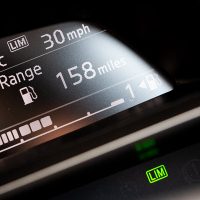Speed Kills: Could ISA Technology Be The Answer?

We all know, and all the research and studies support, that faster speeds mean higher rates of accidents and more severe injuries. In just 2022, there were 12,000 motor vehicle deaths caused by speeding, and speed contributed to deaths in 29% of all accidents that resulted in fatalities. That’s almost one third of all fatal accidents.
And we know, which should seem obvious, that faster speeds cause more pedestrian deaths.
We also know that as newer generations of cars are made, they seem to be going faster and faster. This doesn’t seem to make much sense; why make cars that go faster knowing the dangers that speed causes?
Are We Going Too Fast?
Our cars go way faster than they have to. The maximum speed limit in the United States is 85 miles per hour—much less than the maximum speed of most cars nowadays. Some electric cars can even hit 200 mph.
There actually is technology that can restrict how fast a car goes. But getting car manufacturers to adopt it, not to mention consumers to accept it, is a long shot. The technology is called intelligent speed assistance or ISA.
Types of ISA
ISA can be active or passive. In active systems, a car simply won’t accelerate beyond a certain speed. With passive ISA, the vehicle will give some resistance to acceleration, or feedback to the driver telling him or her that the car is going too fast.
Will Americans Accept It?
One element of ISA is already present on many American vehicles, which is the ability to recognize speed limit signs.
Most Americans are split on whether full ISA should be required technology in cars. Some states or government agencies, such as the City of New York, have experimented with implementing the technology in government vehicles.
That seems to have worked, as data suggests that the rate of immediate sudden braking was significantly reduced.
Others suggest that the technology should be required in vehicles of drivers who have a poor driving record. Washington DC has done just that, saying that those with repeat speeding offenses will need to use the technology.
California has also mandated that all cars sold by 2032 have the technology, although only the passive systems will be required. Those systems will only generate an alert when the car exceeds ten miles above the speed limit. Americans seem to be more accepting of this passive system, with 60% of drivers saying that they would welcome the technology.
Only a Recommendation for Now
The National Highway Traffic and Safety Administration has, after a major 2022 deadly accident in Las Vegas that killed 8 people, already suggested the technology be put into American vehicles—but that’s just a suggestion, and there is no legal requirement that any car manufacturer actually abide by the suggestion.
Injured in an accident that involved speeding drivers? Contact our Rhode Island personal injury lawyers at Robert E. Craven & Associates at 401-453-2700 today.
Sources:
road-safety.transport.ec.europa.eu/european-road-safety-observatory/statistics-and-analysis-archive/esafety/intelligent-speed-adaptation-isa_en#:~:text=What%20is%20ISA%3F,limits%20indicated%20on%20the%20road.
here.com/learn/blog/intelligent-speed-assistance-2024-usa
iihs.org/news/detail/most-drivers-would-be-ok-with-anti-speeding-tech-in-vehicles-survey-shows
